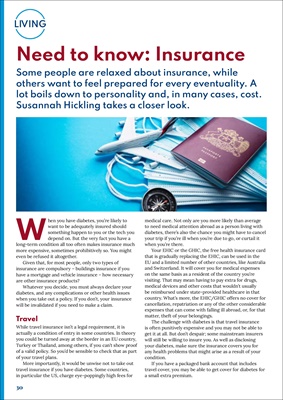
30
LIVING
Need to know: Insurance
Some people are relaxed about insurance, while
others want to feel prepared for every eventuality. A
lot boils down to personality and, in many cases, cost.
Susannah Hickling takes a closer look.
When you have diabetes, you're likely to
want to be adequately insured should
something happen to you or the tech you
depend on. But the very fact you have a
long-term condition all too often makes insurance much
more expensive, sometimes prohibitively so. You might
even be refused it altogether.
Given that, for most people, only two types of
insurance are compulsory - buildings insurance if you
have a mortgage and vehicle insurance - how necessary
are other insurance products?
Whatever you decide, you must always declare your
diabetes, and any complications or other health issues
when you take out a policy. If you don't, your insurance
will be invalidated if you need to make a claim.
Travel
While travel insurance isn't a legal requirement, it is
actually a condition of entry in some countries. In theory
you could be turned away at the border in an EU country,
Turkey or Thailand, among others, if you can't show proof
of a valid policy. So you'd be sensible to check that as part
of your travel plans.
More importantly, it would be unwise not to take out
travel insurance if you have diabetes. Some countries,
in particular the US, charge eye-poppingly high fees for
medical care. Not only are you more likely than average
to need medical attention abroad as a person living with
diabetes, there's also the chance you might have to cancel
your trip if you're ill when you're due to go, or curtail it
when you're there.
Your EHIC or the GHIC, the free health insurance card
that is gradually replacing the EHIC, can be used in the
EU and a limited number of other countries, like Australia
and Switzerland. It will cover you for medical expenses
on the same basis as a resident of the country you're
visiting. That may mean having to pay extra for drugs,
medical devices and other costs that wouldn't usually
be reimbursed under state-provided healthcare in that
country. What's more, the EHIC/GHIC offers no cover for
cancellation, repatriation or any of the other considerable
expenses that can come with falling ill abroad, or, for that
matter, theft of your belongings.
The challenge with diabetes is that travel insurance
is often punitively expensive and you may not be able to
get it at all. But don't despair; some mainstream insurers
will still be willing to insure you. As well as disclosing
your diabetes, make sure the insurance covers you for
any health problems that might arise as a result of your
condition.
If you have a packaged bank account that includes
travel cover, you may be able to get cover for diabetes for
a small extra premium.